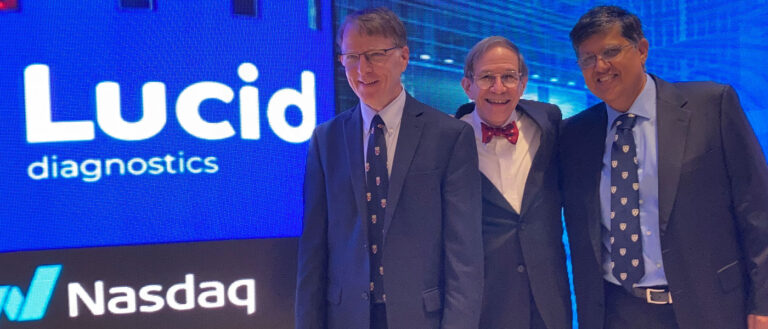Company’s esophageal cancer prevention tests developed jointly by medical school faculty at Case Western Reserve University and University Hospitals
Lucid Diagnostics Inc., a company that produces esophageal cancer tests based on Case Western Reserve University and University Hospitals research, has completed a $70 million initial public offering (IPO) on the Nasdaq Global Market; at the IPO price, the company’s estimated value would be $467 million.
Gastroesophageal reflux disease (GERD) affects about 20% of people in the United States. Many individuals with chronic GERD develop Barrett’s esophagus, which can lead to highly lethal esophageal cancer, the sixth-most common cause of cancer deaths worldwide.
Lucid Diagnostics Inc. (Nasdaq: LUCD), a subsidiary of New York-based PAVmed Inc. (Nasdaq: PAVM), licensed the EsoCheck and EsoGuard technology through Case Western Reserve’s Technology Transfer Office (TTO) in 2018. The U.S. Food and Drug Administration awarded both products Breakthrough Device designation, granted to novel medical devices with the potential to provide more effective treatment and diagnosis of life-threatening or irreversibly debilitating diseases and conditions. EsoCheck received a 2020 Edison Award as one of the year’s most significant innovations in the Medical Testing category.
EsoGuard is a next-generation sequencing (NGS) DNA assay performed on surface esophageal cells collected with EsoCheck. It has been shown to be highly accurate at detecting esophageal precancer and cancer. EsoGuard is commercially available in the United States and has received European CE mark certification. EsoCheck is a U.S. Food and Drug Administration-cleared and European CE Mark-certified noninvasive swallowable balloon capsule catheter device capable of performing targeted and protected sampling of surface esophageal cells in a less-than-five-minute office procedure.
The underlying technology for EsoCheck and EsoGuard was co-invented by Sanford Markowitz, the Ingalls Professor of Cancer Genetics and Medicine at the School of Medicine and an oncologist at University Hospitals (UH) Seidman Cancer Center; Amitabh Chak, a professor of medicine at the School of Medicine, gastroenterologist at the University Hospitals Digestive Health Institute and the Brenda and Marshall B. Brown Master Clinician in Innovation and Discovery at UH Seidman Cancer Center; and Joseph Willis, a professor of pathology at the School of Medicine and pathology vice-chair for translational research at UH.

Markowitz, Chak and Willis were at Nasdaq in New York on Friday to ring the ceremonial bell, marking the close of the day’s stock trading.
“This is a wonderful milestone on a path aimed at preventing death from a miserable cancer through enabling simple early detection of the silent and curable precursor lesions,” Markowitz said. “It is a culmination of years of work from an incredibly talented and committed team and is a superb example of the inventive environment and culture that the university and its Technology Transfer Office have created and fostered.”
The researchers developed the technology as part of the Case Comprehensive Cancer Center’s GI SPORE Program of Research Excellence and BETRNet (Barrett’s Esophagus Translational Research Network) programs, and was first tested in patients during a clinical trial led by Chak at University Hospitals.
Translational support for the founders’ research to develop the technology came from the National Cancer Institute’s GI SPORE and BETRNet programs, the Case-Coulter Translational Research Partnership, Clinical and Translational Science Collaborative, Ohio Third Frontier, Nottingham Spirk Design Collaborative, the Case TTO, and from University Hospitals Seidman Cancer Center funds in support of SPORE clinical trials.
“The continued research accomplishments focused on public and community benefit and clinical value brought by Sandy Markowitz and his team are not only unparalleled, but bring a scientific impact halo to this school and the university that will remain a shining star for a very long period to come,” said Stan Gerson, dean of the School of Medicine and the Asa and Patricia Shiverick–Jane Shiverick (Tripp) Professor of Hematological Oncology.
“This remarkable achievement reflects the incredible hard work and dedication of our colleagues to combat esophageal cancer, a devastating illness,” said Mukesh Jain, the Ellery Sedgwick Chair and Distinguished Scientist and vice dean and Distinguished University Professor at the School of Medicine and chief scientific officer for the University Hospitals Health System. “This milestone also reflects the importance of the robust partnership between the two institutions that is advancing the science of health to improve the lives of patients locally and globally.”
“Drs. Sandy Markowitz, Amitabh Chak and Joe Willis have partnered with PAVmed Inc. and its CEO, Dr. Lishan Aklog, to bring this transformative technology—a unique device and genetic test combination—to patients for the earliest detection and treatment of esophageal cancer,” said Daniel Simon, professor of medicine at the School of Medicine and president of academic and external affairs and chief scientific officer at University Hospitals. “Case Western Reserve University and University Hospitals are committed to create partnerships to advance the health of our patients and our community.”


